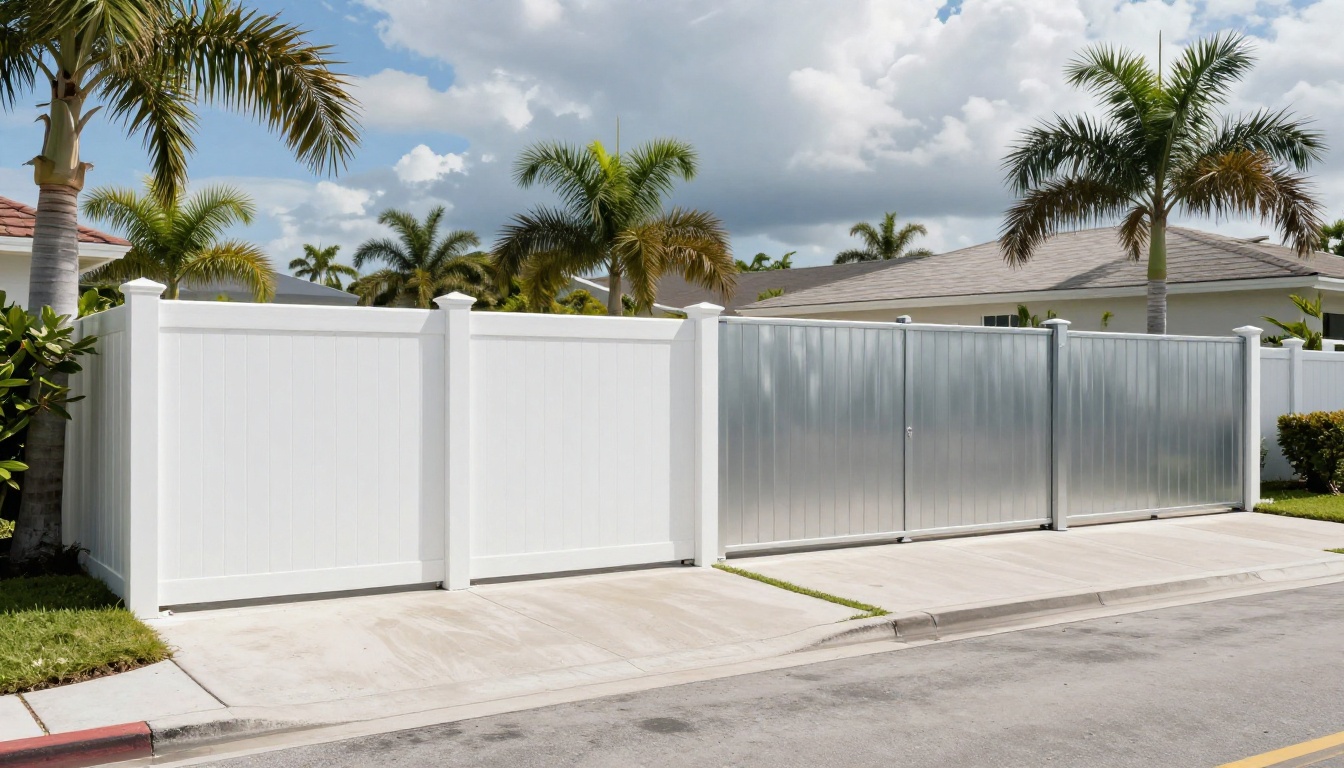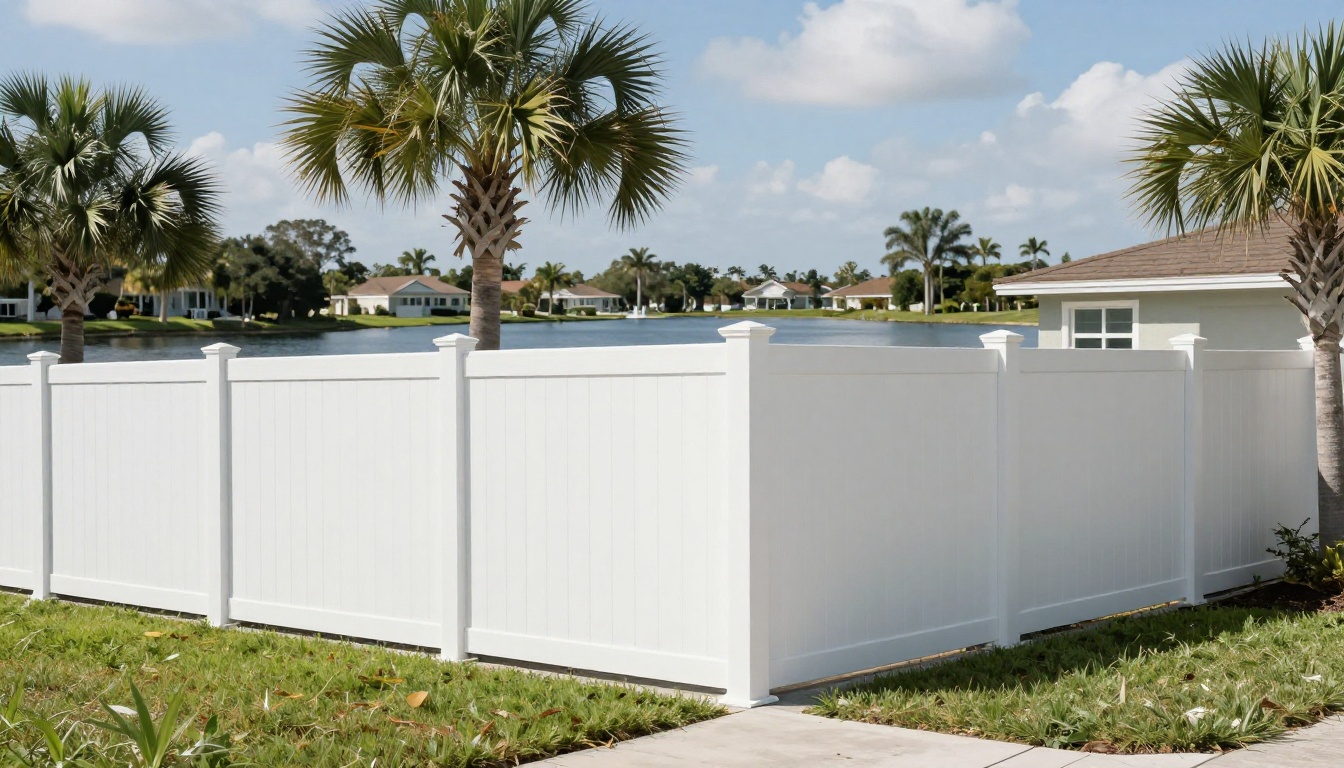July 20, 2025
How Much Does Fence Installation Cost in Cape Coral, FL?
Average Fence Installation Costs in Cape Coral, FL
Fence installation costs in Cape Coral, FL, can vary significantly depending on the material and design you choose. On average, homeowners can expect to pay between $15 and $45 per linear foot for materials like wood, vinyl , PVC, chain link, and aluminum. Wood fences typically fall on the lower end of this range, while ornamental aluminum and high-end vinyl fences are more expensive. Factors such as fence height, style, and customization options also play a role in determining the final price. Additionally, labor costs and site conditions can cause fluctuations in overall expenses.
Compared to national averages, Cape Coral's fence installation costs may be slightly higher due to regional factors like soil composition, climate considerations, and local labor rates. For example, Florida's sandy soil often requires additional groundwork to ensure stability, which can increase installation costs. If you're looking for professional guidance, companies like Royal Fence Inc. can provide tailored estimates based on your specific needs and property conditions.
Breakdown of Costs by Fence Type
Wood fences are a popular choice in Cape Coral due to their affordability and classic aesthetic. On average, they cost between $15 and $30 per linear foot installed. Wood offers versatility with options like privacy, picket, and split-rail designs. Homeowners often choose wood for its natural look and ability to complement various landscaping styles. However, it does require regular maintenance to prevent rot and termite damage.
PVC and vinyl fences are gaining popularity for their low-maintenance appeal and durability. These materials typically cost between $25 and $45 per linear foot. Vinyl fences come in a variety of colors and styles, including privacy and decorative options, making them ideal for modern homes. Their resistance to weathering and pests makes them a smart long-term investment, especially in Florida's humid climate.
Chain link fences are an economical option, costing around $10 to $20 per linear foot. They are commonly used for securing large properties or backyards where aesthetics aren't a priority. While chain link fences lack privacy, they are highly durable and require minimal upkeep. In Cape Coral, they are often seen in industrial areas or as boundary markers for residential lots.
Aluminum fences offer a sleek, decorative look at a mid-range price point of $25 to $40 per linear foot. These fences are lightweight yet sturdy, making them perfect for enhancing curb appeal without obstructing views. Aluminum is rust-resistant, which is a significant advantage in Cape Coral's coastal environment. Many homeowners use aluminum fences to enclose pools or front yards while maintaining an open feel.
Ornamental and decorative fences, often made from wrought iron or premium aluminum, are the most expensive option, ranging from $40 to $60 per linear foot. These fences are designed to make a bold statement and are ideal for upscale properties. While they come with a higher upfront cost, their longevity and timeless beauty can add significant value to your home. In Cape Coral, ornamental fences are frequently used to enhance luxury estates and gated communities.
What Is Included in Fence Installation?
When you hire a professional fence installer, the standard package usually includes labor, materials, site preparation, and basic cleanup after the job is complete. Labor covers everything from measuring and marking the area to digging post holes and assembling the fence. Materials encompass the fence panels, posts, hardware, and any necessary reinforcements. Site prep involves clearing debris, leveling the ground, and ensuring proper alignment. Cleanup ensures that your property is left tidy once the project is finished.
However, some services come at an additional cost. For instance, removing an old fence, installing custom gates, or obtaining permits may require extra fees. It's important to discuss these potential extras with your installer upfront to avoid surprises. Companies like Royal Fence Inc. can help clarify what’s included in their quotes and identify any hidden costs before work begins.
Factors That Impact Fence Installation Cost
The size of your yard and the length of the fence are primary factors influencing installation costs. Larger properties naturally require more materials and labor, which increases the overall expense. Similarly, complex designs or taller fences will demand more resources and time to complete. Homeowners should also consider how the terrain affects pricing; uneven or sloped landscapes may require additional adjustments and labor.
Material choice plays a significant role in determining cost. High-end materials like ornamental aluminum or premium vinyl tend to be pricier than basic chain link or standard wood. Adding gates, decorative elements, or custom features can further drive up the price. These enhancements not only improve functionality but also boost curb appeal, making them worthwhile investments for many homeowners.
Local factors such as soil type, property access, and permitting requirements can also impact pricing. Sandy soils in Cape Coral may necessitate deeper post holes or concrete footings, adding to labor costs. Limited access to the property might require special equipment or longer setup times. Additionally, navigating local codes and obtaining permits can introduce delays and fees. Working with a knowledgeable local installer ensures compliance and minimizes unexpected expenses.
Labor Costs for Fence Installation
Labor costs for fence installation in Cape Coral typically range from $10 to $25 per linear foot, depending on the complexity of the project and the experience of the contractor. This rate generally includes all aspects of the job, from initial measurements to final cleanup. Experienced installers often charge higher rates, but their expertise can save money in the long run by ensuring quality workmanship and avoiding costly mistakes.
Several factors can affect labor costs, including the time of year and the condition of your property. Off-season installations during cooler months may result in lower rates due to reduced demand. Conversely, challenging terrain or tight spaces can lead to surcharges. To maximize savings, it's wise to get multiple quotes and compare the scope of services offered by different contractors.
Permit and Code Requirements in Cape Coral
In Cape Coral, obtaining a permit is a crucial step in the fence installation process. Permits ensure that your project complies with local zoning laws and building codes, which are designed to protect both safety and property values. Failure to secure a permit can result in fines or even mandatory removal of the fence. Fees for permits typically range from $50 to $200, depending on the scope of the project.
Some homeowners are surprised by additional code requirements, such as setback distances or height restrictions. Choosing a local installer familiar with Cape Coral regulations can streamline the permitting process and prevent costly errors. Companies like Royal Fence Inc. have extensive experience navigating these rules, ensuring a smooth and compliant installation.
Pros and Cons of Fence Material Options
Wood fences offer excellent privacy and are relatively affordable, making them a practical choice for many homeowners. They provide a warm, natural aesthetic and can be customized with stains or paints to match your home's exterior. However, wood requires regular maintenance to prevent issues like warping, cracking, or pest infestations. Over time, these upkeep costs can add up, potentially offsetting the initial savings.
Vinyl and PVC fences are prized for their low maintenance and modern appearance. Unlike wood, they don't need painting or sealing and are resistant to moisture and insects. This makes them particularly well-suited for Cape Coral's humid climate. While the upfront cost is higher, their durability and minimal upkeep can make them a cost-effective option over the long term. However, vinyl fences may lack the rustic charm that some homeowners prefer.
Chain link and aluminum fences strike a balance between affordability and functionality. Chain link is economical and highly durable but offers little privacy. Aluminum, on the other hand, combines strength with elegance, making it ideal for decorative purposes. Both materials are resistant to corrosion, which is essential in coastal areas like Cape Coral. When selecting a material, consider how it aligns with your priorities for aesthetics, maintenance, and budget.
Cost-Saving Tips for Fence Installation
There are several ways to reduce the cost of fence installation without compromising quality. Start by comparing quotes from multiple contractors to ensure competitive pricing. Opting for off-season installation can also yield savings, as demand tends to drop during cooler months. Another strategy is tackling site preparation or demolition yourself if you have the skills and tools, though this approach carries some risk of errors.
To avoid unnecessary expenses, steer clear of common mistakes like skipping permits or choosing overly complex designs. These oversights can lead to fines, rework, or even structural failures. Additionally, be cautious about cutting corners on materials; cheaper options may save money upfront but could result in higher repair or replacement costs down the line. Working with a reputable installer like Royal Fence Inc. can help you strike the right balance between cost and quality.
How to Choose the Right Fence Installer in Cape Coral
Hiring a licensed and insured local contractor is one of the best decisions you can make when installing a fence. Local installers understand the unique challenges of Cape Coral's terrain and climate, ensuring your fence is built to last. They are also familiar with local codes and permitting processes, reducing the risk of compliance issues. Always verify credentials and check references to confirm the installer's reputation.
When evaluating potential contractors, ask detailed questions about their experience, warranties, and payment terms. Request a written estimate that breaks down costs for materials, labor, and any extras. Compare multiple bids to ensure you're getting fair pricing. Finally, review contracts carefully before signing to avoid misunderstandings later. Taking these steps will help you find a reliable partner for your fence installation project.
Signs You May Need to Replace Your Existing Fence
If your current fence shows signs of rot, rust, or storm damage, it may be time for a replacement. Other indicators include sagging posts, broken panels, or gaps that compromise security and privacy. A deteriorating fence not only detracts from your property's appearance but can also pose safety hazards. Addressing these issues promptly ensures your outdoor space remains functional and attractive.
Expected Timeframes for Fence Installation
The duration of a fence installation project depends on factors like fence type, size, and site conditions. Simple projects, such as chain link fences, can often be completed in a day or two, while larger or more intricate designs may take a week or longer. Weather delays, permit approvals, and material availability can also affect timelines. Planning ahead and working with an experienced installer can help minimize disruptions and keep the project on schedule.
Fence Maintenance and Longevity Considerations
Different fence materials have varying maintenance needs and lifespans. Wood fences require periodic staining or painting to protect against moisture and UV exposure. Vinyl fences need occasional cleaning to remove dirt and mildew, while aluminum fences benefit from rinsing to prevent salt buildup in coastal areas. Regular inspections for damage or wear can extend the life of any fence and prevent costly repairs.
In Florida's harsh climate, wood fences typically last 10-20 years with proper care, while vinyl and aluminum fences can endure 20-30 years or more. Chain link fences have a similar lifespan but may show signs of rust sooner if not galvanized. Investing in high-quality materials and routine maintenance ensures your fence remains both functional and visually appealing for years to come.
FAQ: Common Questions About Fence Installation Costs in Cape Coral, FL
1. What is the a verage cost per linear foot for a privacy fence in Cape Coral?
Privacy fences in Cape Coral generally cost between $20 and $45 per linear foot, depending on the material and design. Wood and vinyl are popular choices, with vinyl offering greater durability and lower maintenance. Factors like fence height, customization, and site conditions can influence the final price.
2. Are there extra costs for removing an old fence?
Yes, removing an old fence typically incurs additional charges, ranging from $5 to $15 per linear foot. This service includes dismantling, hauling away debris, and preparing the site for new installation. Discussing this upfront with your contractor ensures transparency in pricing.
3. How much does a permit cost and how long does approval take?
Permit fees in Cape Coral usually range from $50 to $200, depending on the project scope. Approval times vary but typically take 1-2 weeks. Some expedited options may be available for an additional fee, allowing quicker starts to your fence installation.
4. Is it more affordable to install a fence DIY or hire a contractor?
While DIY installation can save on labor costs, it often requires significant time, skill, and tools. Mistakes can lead to costly repairs or non-compliance with codes. Hiring a professional ensures quality workmanship and adherence to regulations, making it a safer and more reliable choice for most homeowners.
5. How do storms or hurricanes in Cape Coral impact fence installation?
Cape Coral's storm-prone climate necessitates using durable, wind-resistant materials like aluminum or reinforced vinyl. Building codes may dictate specific design requirements to withstand hurricane-force winds. Proper installation and material selection reduce the risk of damage and insurance claims during severe weather events.
Conclusion
Installing a fence in Cape Coral involves careful consideration of material choices, property specifics, and local regulations. Each factor contributes to the overall cost, from material prices and labor rates to permit fees and site conditions. By understanding these variables, homeowners can make informed decisions that align with their budget and aesthetic preferences.
To ensure a successful project, gather multiple estimates from reputable local installers and prioritize long-term maintenance and compliance with city codes. A well-planned fence not only enhances your property's appearance but also provides security, privacy, and peace of mind. Ready to get started? Connect with experienced Cape Coral fence installers like Royal Fence Inc. to explore your options and receive detailed cost estimates tailored to your needs.


